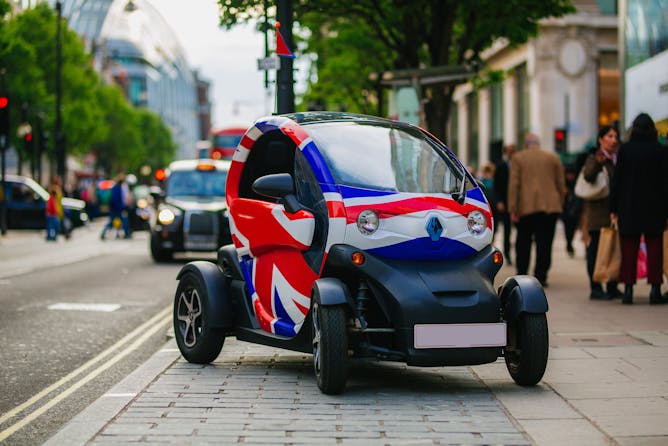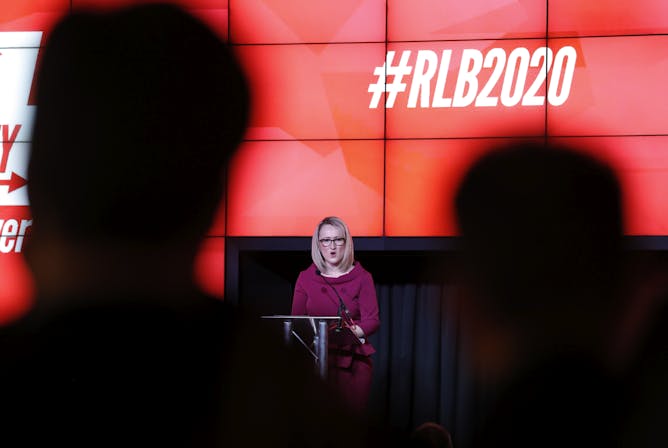|
|
|
Editor's note
|
|
Last year, less than 2% of new cars sold in the UK were electric. By 2035, the government aims to bring that as close to 100% as possible, as sales of new petrol, diesel and hybrid cars will be banned. It’s going to be an uphill struggle, but a lecturer in vehicle electrification at Loughborough University, Ashley Fly, believes it can be done – if big changes start right now.
The UK is lucky to have a wealth of talent and experience in car manufacturing – in 2018, the UK was the fourth largest vehicle producer. But most of those run on fossil fuels, and that £82 billion industry will need to urgently retrain its workforce to make electric vehicles instead. The government has promised £274 million for new car battery research, but they’ll have to keep the money flowing to ensure more efficient electric cars can run off the drawing board and into driveways over the next 15 years.
All those cars are likely to need more than 80 terawatt hours (TWh) of electricity each year, an increase in the total demand on the national grid by a quarter. All the more reason to speed up the roll-out of renewable energy so that there are more solar farms, wind turbines and power lines to meet demand, and more recycling facilities to process and re-use the components of old car batteries.
Buses and transit vans might run more efficiently on hydrogen fuel cells – as some buses in London already do. But achieving this throughout the UK in less than two decades will mean massive investment and a commitment to getting started right away. What the government does in the next few years should tell us how serious they are about meeting the 2035 target.
Meanwhile, a new trend called “leaveism”, has researchers worried. It has nothing to do with Brexit, and everything to do with a dysfunctional work-life balance that’s causing British workers to use annual leave to recover from illness or look after sick relatives. In other news, a professor of politics asks: is grassroots democracy the best way to decide a political leader?
And following the US senate’s vote last night to throw out impeachment charges against President Donald Trump, we consider the parallels with the Roman republic.
|
Jack Marley
Commissioning Editor
|

|
|
Top stories
|

The future of British motoring?
Bubble_Tea Stock/Shutterstock
Ashley Fly, Loughborough University
It may seem a long way away, but a 2035 ban requires investment and major changes right now.
|

Happy holiday!
Diego Cervo/Shutterstock
Ian Hesketh, University of Manchester; Cary Cooper, University of Manchester
Why hit the beach on holiday when you can use your annual leave to be ill at home instead?
|

Peter Byrne/PA
Meg Russell, UCL
Labour's leadership election is about to enter its final phase – but will the winner command the support of MPs?
|
Politics + Society
|
-
Timothy Joseph, College of the Holy Cross
President Trump's impeachment defense that the will of the president is no different from the will of the state and the good of the people has echoes in the decline of ancient Rome's democracy.
-
Tim Bale, Queen Mary University of London; Paul Webb, University of Sussex
There seems little chance of getting people to agree on the big picture, but even partisans see eye-to-eye sometimes when you get down to the nitty gritty.
-
Alan Greene, University of Birmingham
Governments must think very carefully before sacrificing the very human rights that give the state its identity and democracy.
-
Jamie Gaskarth, University of Birmingham
Tensions have emerged before over US-UK intelligence sharing, but the Johnson government's decision over Huawei is different.
-
Chris Williams, Bournemouth University
The range of movies in the visual effects category shows how advanced this science has become.
|
|
Arts + Culture
|
-
Claire Markham, Nottingham Trent University
Local watering holes are closing up and down the country, shaking up their offerings and making the most of their heritage may just help save them
|
|
Science + Technology
|
-
Tim Schweisfurth, University of Southern Denmark; René Chester Goduscheit, Aarhus University
Machines mostly innovate on narrow dataset, which limits their creativity.
|
|
Health + Medicine
|
-
Gemma Lasseter, University of Bristol
A sense of wellbeing can have an important affect on parents' decisions when it comes to health care.
|
|
Cities
|
-
Stefan Gössling, Lund University
Whether you like or hate them, the way transport operates in cities needs to change.
|
|
| |
Featured events
|

|
5 West 2.1, University of Bath, Claverton Down, Bath, Bath and North East Somerset, BA2 7AY, United Kingdom of Great Britain and Northern Ireland — University of Bath
|

|
Yorkshire Room, JB Morrell Library, Campus West, York, York, YO10 5DD, United Kingdom of Great Britain and Northern Ireland — University of York
|

|
School of the Arts, 19-23 Abercromby Square, Liverpool, L69 7ZG, United Kingdom of Great Britain and Northern Ireland — University of Liverpool
|

|
Bowland Auditorium, Berrick Saul Building, Campus West, York, York, YO10 5DD, United Kingdom of Great Britain and Northern Ireland — University of York
|
|
|
|
| |
| |
| |
| |
| |
|
|
|
|
|
|
|